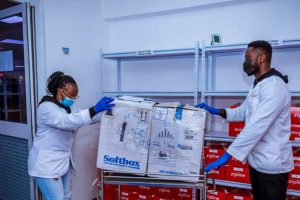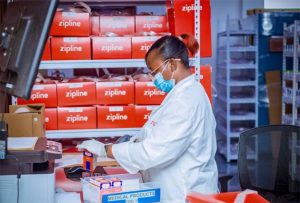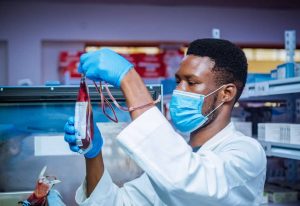Naa Adorkor Yawson
Country Manager of Zipline Ghana, Naa Adorkor Yawson, has revealed that, the inclusion of Zipline’s medical drone delivery technology into the nation’s medical logistic supply system, is addressing the challenge of access to healthcare delivery and aiding Ghana on the road to achieving Universal Healthcare Coverage (UHC).
In her estimation, the country, just like many others in the sub-region, faces major challenges of access to Universal healthcare delivery resulting in several mortality rates, especially in areas of child and maternal mortality. However, with the introduction of the Zipline technology in Ghana, these identified challenges have seen incredible improvement.

“In order to help alleviate identified challenges of access in the health sector, the government has made several investments, both capital and infrastructural, to protect people from bottlenecks of getting access to medical healthcare delivery. One of such bold investments is the adoption of the Ziplines Technology to deliver medical commodities to communities, including those that are hard-to-reach. Today, more than 2,500 health facilities across the country can access various medical products, including COVID-19 vaccines on-demand, no matter the location”, Mrs. Yawson said.
Ghana’s 2020-2030 Universal Health Coverage roadmap aims at creating access to high-quality essential healthcare and population-based services by 2030. This, Mrs. Yawson says, will mean achieving a balance between access to Critical healthcare in both rural and urban areas ably facilitated by public-private partnerships.

“It is reassuring to know that achieving UHC is one of the necessary but ambitious targets set out by the country to be concluded in a decade. As partners for health development, we are enjoined to affirm our commitment to this by providing solutions and actions that deliver equal access to healthcare needs of both rural and urban communities. With the obvious global challenge of COVID-19 pandemic, where every country is challenged to evenly distribute vaccines as a way of fighting the pandemic, Zipline came handy to support the government of Ghana in storing and effectively distributing vaccines to communities within our reach. So far, we have delivered over 1million of these COVID-19 vaccines”, the Country Manager said.

It will be recalled that in 2019, the Ministry of Health entered a partnership with Zipline in order to support the Ministry in delivering essential medical supplies, vaccines and blood in Ghana, including in remote areas where infrastructure presents challenges of access.
This, in the ensuing period, has seen Zipline make over 1.5 million deliveries, couriered over 5,000 units of blood, delivered more than 700,000 medical product units and continues to serve over 2,500 health facilities in remote areas with timely medical assistance. Today, Zipline is the sole distributor of all programmed vaccines in the Western North Region making it almost difficult for a child to miss being vaccinated..
Recently, the Ghana Health Service commended the work of Zipline for having contributed to improving maternal healthcare delivery, leading to a decrease in child and maternal mortality. The Health Service emphasized that available statistics estimates indicate maternal deaths declined from 875 in 2018 to 776 in 2020. This figure is projected to decline further in 2022. Zipline’s storage and distribution hubs present in six regions have brought medical relief to hospitals in rural areas, contributing to universal health coverage further from urban areas.

A recent external study of Zipline’s impact was conducted by IDinsight, a mission-driven global advisory, data analytics and research organization, and analyzed health facilities served by three of Zipline’s distribution centers in Ghana. The results indicate that Zipline meaningfully contributes to the Ghanaian government’s work to expand healthcare across the country, with a statistically significant impact on health access, equity, inventory availability and supply chain performance. The data shows the Zipline system hortened vaccine stock outs by 60%, and decreased inventory-driven missed vaccination opportunities by 42%, decreased days facilities were without critical medical supplies by 21%, while it increased the types of medicines and supplies stocked at health facilities by 10%.
Explaining the import of the numbers, Mrs Yawson said, the statistics are a “testament of how Ziplines technology has made positive contributions to addressing issues of Universal Healthcare Delivery in Ghana, with focus on solving the inequalities of access and positioning the country as the world’s first and only national scale delivery service”.
She assured that the company will continue to amplify the need to ensure that the impact of their work is sustainable, by providing support in the areas of medical logistics and medication delivery and other supplies needed to mitigate the challenges of ill-resourced health centres, which are the underlining hurdles to achieving healthcare for all.


